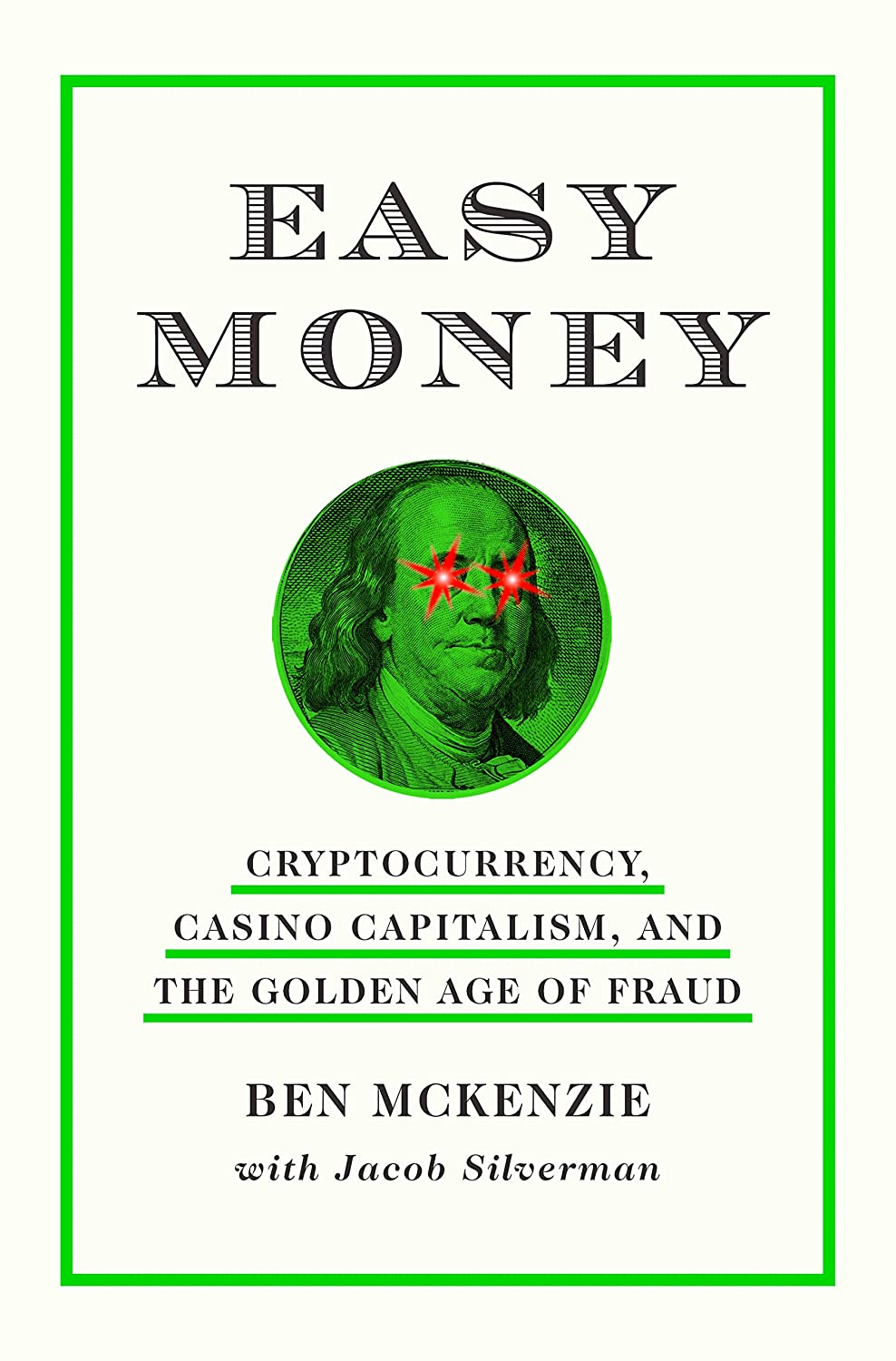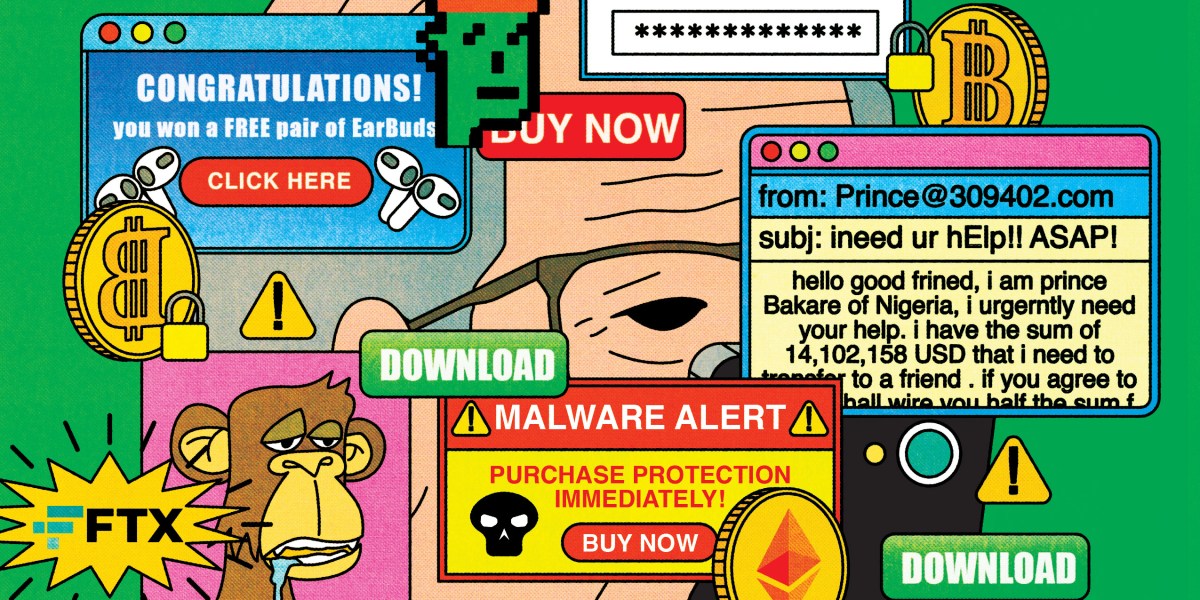Shapiro’s ebook arrives simply in time for the final gasp of the newest crypto wave, as main gamers discover themselves trapped within the nets of human establishments. In early June, the US Securities and Trade Fee went after Binance and Coinbase, the 2 largest cryptocurrency exchanges on the planet, a number of months after charging the notorious Sam Bankman-Fried, founding father of the large crypto trade FTX, with fraud. Whereas Shapiro mentions crypto solely as the principle technique of fee in on-line crime, the business’s wild journey by way of finance and tradition deserves its personal hefty chapter within the narrative of web fraud.
It could be too early for deep evaluation, however we do have first-person views on crypto from actor Ben McKenzie (former star of the teenager drama The O.C.) and streetwear designer and influencer Bobby A whole lot, the authors of—respectively—Simple Cash and NFTs Are a Rip-off/NFTs Are the Future. (Extra closely reported books on the crypto period from tech reporter Zeke Fake and Huge Quick writer Michael Lewis are within the works.)
“If we’re committing critical crimes like fraud, it’s crucially vital that we discover methods to justify our habits to others, and crucially, to ourselves.”
Ben McKenzie, former star of The O.C.
McKenzie testified on the Senate Banking Committee’s listening to on FTX that he believes the cryptocurrency business “represents the most important Ponzi scheme in historical past,” and Simple Cash traces his personal journey from bored pandemic dabbler to dedicated crypto critic alongside the business’s rise and fall. A whole lot additionally writes a chronological account of his time in crypto—particularly in nonfungible tokens, or NFTs, digital representational objects that he has purchased, offered, and “dropped” on his personal and thru The A whole lot, a “community-based streetwear model and media firm.” For A whole lot, NFTs have worth as cultural artifacts, and he’s not satisfied that their time needs to be over (though he acknowledges that between 2019 and the writing of his ebook, greater than $100 million value of NFTs have been stolen, principally by way of phishing scams). “Whether or not or not NFTs are a rip-off poses a philosophical query that wanders into ethical judgments and cultural practices round free enterprise, mercantilism, and materialism,” he writes.

ABRAMS, 2023
For all their variations (a lawyer, an actor, and a designer stroll right into a bar …), Shapiro, McKenzie, and A whole lot all discover characters, motivations, and social dynamics far more than they do technical improvements. On-line crime is a human story, these books collectively argue, and explanations of why it occurs, why it really works, and the way we are able to keep secure are human too.
To articulate how web crime involves be, Shapiro provides a brand new paradigm for the connection between humanity and know-how. He relabels technical pc code “downcode” and calls every part human surrounding and driving it “upcode.” From “the interior operations of the human mind” to “the outer social, political, and institutional forces that outline the world,” upcode is the teeming ecosystem of people and human techniques behind the scenes of know-how. Shapiro argues that upcode is answerable for all of know-how’s impacts—constructive and unfavourable—and downcode is simply its product. Technical instruments just like the blockchain, firewalls, or two-factor authentication could also be applied as efforts to make sure security on-line, however they can not deal with the foundation causes upstream. For any technologist or crypto fanatic who believes pc code to be legislation and sees human error as an annoying hiccup, this concept could also be disconcerting. However crime begins and ends with people, Shapiro argues, so upcode is the place we should focus each our blame for the issue and our efforts to enhance on-line security.
McKenzie and A whole lot take care of crypto and NFTS nearly totally on the upcode degree: neither has coaching in pc science, and each look at the business by way of private lenses. For McKenzie, it’s the monetary realm, the place pals inspired him to spend money on tokens to compensate for being out of labor through the pandemic. For A whole lot, it’s the artwork world, which has traditionally been inaccessible to most and inhospitable for a lot of—and is what led him to gravitate towards streetwear as a artistic outlet within the first place. A whole lot noticed NFTs as a sign of a bigger constructive shift towards Web3, a nebulous imaginative and prescient of a extra democratized type of the web the place artistic people might receives a commission for his or her work and construct communities of followers and artists with out counting on tech firms. The attraction of Web3 and NFTs relies in cultural and financial realities; likewise, on-line scams occur as a result of buggy upcode—like social injustice, runaway capitalism, and company monopolies—creates the circumstances.
Establishing downcode guardrails to permit in solely “good” intentions received’t clear up on-line crime as a result of dangerous acts will not be so simply dismissed because the work of dangerous actors. The individuals who perpetrate scams, fraud, and hacks—and even take part within the techniques round it, like speculative markets—typically subscribe to an ethical rubric as they act illegally. In Fancy Bear, Shapiro cites the seminal analysis of Sarah Gordon, the primary to analyze the psychology of people that wrote pc viruses when this malware first popped up within the Nineties. Of the 64 respondents to her international survey, all however one had developmentally acceptable ethical reasoning primarily based on ethics, in response to a framework created by the psychologist Lawrence Kohlberg: that’s, these virus writers made selections primarily based on a conscience. Newer analysis from Alice Hutchings, the director of the College of Cambridge’s Cybercrime Centre, additionally discovered hackers as a bunch to be “ethical brokers, possessing a way of justice, goal, and id.” Many hackers discover neighborhood of their work; others, like Edward Snowden, who leaked labeled data from the US Nationwide Safety Company in 2013, cross authorized boundaries for what they consider to be expressly ethical causes. Bitcoin, in the meantime, could also be a frequent agent of crime however was in actual fact created to supply a “trustless” method to keep away from counting on banks after the housing disaster and authorities bailouts of the 2000s left many questioning if conventional monetary establishments might be trusted with shopper pursuits. The definition of crime can be upcode, formed by social contracts in addition to authorized ones.

MCD, 2023
In NFTs Are a Rip-off/NFTs Are the Future, A whole lot interviews the famend tech investor and public speaker Gary Vaynerchuk, or “Gary Vee,” a determine he calls the “face of NFTs.” It was Vee’s “zeal and perception” that satisfied A whole lot to create his personal NFT assortment, Adam Bomb Squad. Vee tells A whole lot that critics “could also be proper” after they name NFTs a rip-off. However whereas some initiatives could also be opportunistic rackets, he hopes the work he makes is the range that endures. Vee is perhaps mendacity right here, however at face worth, he professes a perception in a higher good that he and everybody he recruits (together with the 1000’s of attendees at his NFT conference) may also help construct—even when there’s hurt alongside the way in which.

